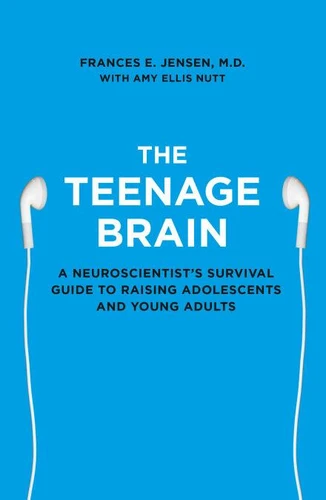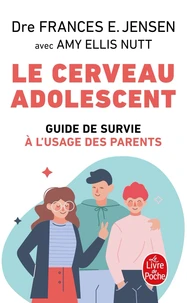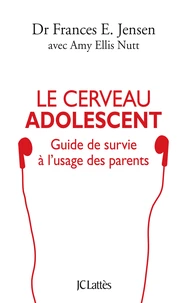The Teenage Brain. A neuroscientist’s survival guide to raising adolescents and young adults
Par :Formats :
Disponible dans votre compte client Decitre ou Furet du Nord dès validation de votre commande. Le format ePub protégé est :
- Compatible avec une lecture sur My Vivlio (smartphone, tablette, ordinateur)
- Compatible avec une lecture sur liseuses Vivlio
- Pour les liseuses autres que Vivlio, vous devez utiliser le logiciel Adobe Digital Edition. Non compatible avec la lecture sur les liseuses Kindle, Remarkable et Sony
- Non compatible avec un achat hors France métropolitaine
 , qui est-ce ?
, qui est-ce ?Notre partenaire de plateforme de lecture numérique où vous retrouverez l'ensemble de vos ebooks gratuitement
Pour en savoir plus sur nos ebooks, consultez notre aide en ligne ici
- Nombre de pages384
- FormatePub
- ISBN978-0-00-744832-6
- EAN9780007448326
- Date de parution01/01/2015
- Protection num.Adobe DRM
- Infos supplémentairesepub
- ÉditeurThorsons
Résumé
Why is it that the behaviour of teenagers can be so odd? As they grow older, young children steadily improve their sense of how to behave, and then all of a sudden, they can become totally uncommunicative, wildly emotional and completely unpredictable.
We used to think that erratic teenage behaviour was due to a sudden surge in hormones, but modern neuroscience shows us that this isn't true. The Teenage Brain is a journey through the new discoveries that show us exactly what happens to the brain in this crucial period, how it dictates teenagers' behaviour, and how the experiences of our teenage years are what shape our attitudes, and often our happiness in later life.
Many of our ideas about our growing brains are completely re-written.
They don't stop developing at the end of our teens - they keep adapting until we are in our mid-twenties. They are wired back to front, with the most important parts, the parts that we associate with good judgement, concentration, organization and emotional and behavioural control being connected last of all. The Teenage brain is a powerful animal primed for learning, but this creates problems.
Addiction is a form of learning, and Frances Jensen, Professor of Pediatric Neurology at the teaching hospital of Harvard Medical School reveals exactly what lies behind all aspects of teenage behaviour and its lasting effects - from drugs, lack of sleep and smoking to multi-tasking and stress. As a mother and a scientist, Professor Jensen offers both exciting science and practical suggestions for how parents, teens and schools can help teenagers weather the storms of adolescence, and get the most out of their incredible brains.
They don't stop developing at the end of our teens - they keep adapting until we are in our mid-twenties. They are wired back to front, with the most important parts, the parts that we associate with good judgement, concentration, organization and emotional and behavioural control being connected last of all. The Teenage brain is a powerful animal primed for learning, but this creates problems.
Addiction is a form of learning, and Frances Jensen, Professor of Pediatric Neurology at the teaching hospital of Harvard Medical School reveals exactly what lies behind all aspects of teenage behaviour and its lasting effects - from drugs, lack of sleep and smoking to multi-tasking and stress. As a mother and a scientist, Professor Jensen offers both exciting science and practical suggestions for how parents, teens and schools can help teenagers weather the storms of adolescence, and get the most out of their incredible brains.
Why is it that the behaviour of teenagers can be so odd? As they grow older, young children steadily improve their sense of how to behave, and then all of a sudden, they can become totally uncommunicative, wildly emotional and completely unpredictable.
We used to think that erratic teenage behaviour was due to a sudden surge in hormones, but modern neuroscience shows us that this isn't true. The Teenage Brain is a journey through the new discoveries that show us exactly what happens to the brain in this crucial period, how it dictates teenagers' behaviour, and how the experiences of our teenage years are what shape our attitudes, and often our happiness in later life.
Many of our ideas about our growing brains are completely re-written.
They don't stop developing at the end of our teens - they keep adapting until we are in our mid-twenties. They are wired back to front, with the most important parts, the parts that we associate with good judgement, concentration, organization and emotional and behavioural control being connected last of all. The Teenage brain is a powerful animal primed for learning, but this creates problems.
Addiction is a form of learning, and Frances Jensen, Professor of Pediatric Neurology at the teaching hospital of Harvard Medical School reveals exactly what lies behind all aspects of teenage behaviour and its lasting effects - from drugs, lack of sleep and smoking to multi-tasking and stress. As a mother and a scientist, Professor Jensen offers both exciting science and practical suggestions for how parents, teens and schools can help teenagers weather the storms of adolescence, and get the most out of their incredible brains.
They don't stop developing at the end of our teens - they keep adapting until we are in our mid-twenties. They are wired back to front, with the most important parts, the parts that we associate with good judgement, concentration, organization and emotional and behavioural control being connected last of all. The Teenage brain is a powerful animal primed for learning, but this creates problems.
Addiction is a form of learning, and Frances Jensen, Professor of Pediatric Neurology at the teaching hospital of Harvard Medical School reveals exactly what lies behind all aspects of teenage behaviour and its lasting effects - from drugs, lack of sleep and smoking to multi-tasking and stress. As a mother and a scientist, Professor Jensen offers both exciting science and practical suggestions for how parents, teens and schools can help teenagers weather the storms of adolescence, and get the most out of their incredible brains.





